Couple Rescues Abandoned Baby Squirrel And Raises Her Properly
Can you imagine coming home after a long day and finding that a mother squirrel had made a nest of twigs, dried pine needles, and branches on your bed and placed two newborn baby squirrels inside? How would you respond?
For one man, the obvious answer was to call a local couple well-versed in wildlife rescue and rehabilitation, Christina and Michael. It turned out to be one of the best possible choices for such small, delicate creatures, but surely no one could have guessed how the story would unfold.
The couple's first goal was to reunite the babies with their mother, but it became clear that as the mother came and went, she had no intention of taking her babies anywhere with her. Her original nest was reportedly destroyed due to nearby construction...
Eventually, the mother squirrel stopped coming back to her babies altogether, and that's where the story takes its next wild turn.
Without their mother, one of the babies died. So, Christina and Michael had the surviving baby evaluated by a wildlife veterinarian, who also determined that the baby would likely not survive either.
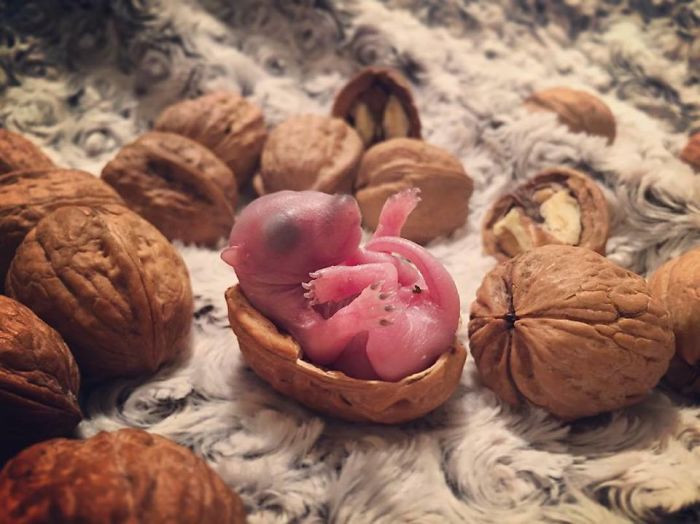
Michael and Christina decided to care for the surviving baby themselves.
They named her Thumbelina and adopted her to care for her and see her rehabilitated. They said, "Almost all squirrels we take in are rescued and released into the wild, but Thumbelina was a special case."
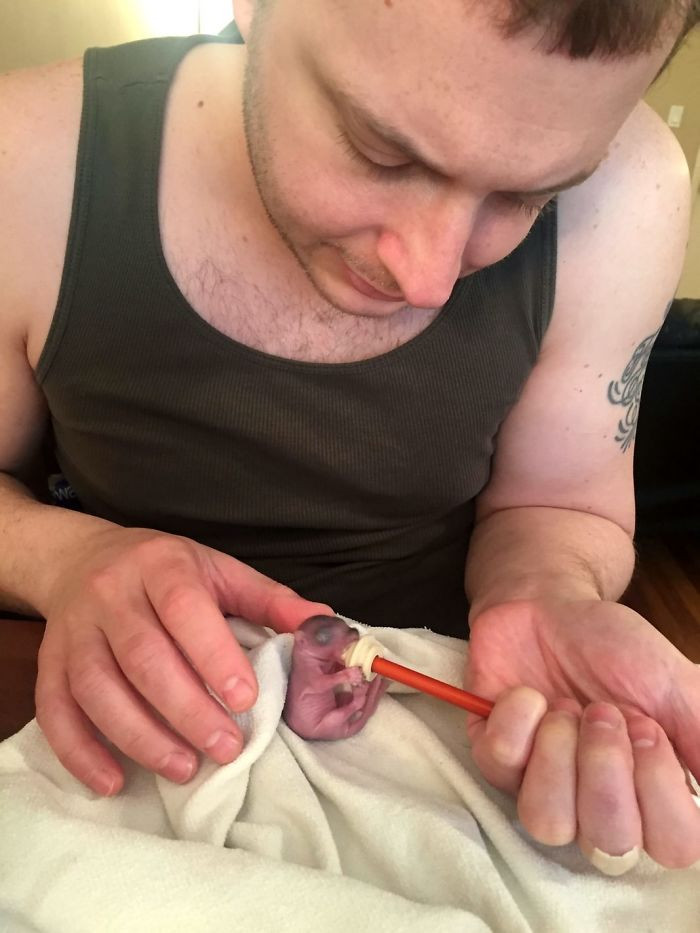
Thumbelina's case was definitely unique.
She was born in an unusual season, and losing her sister meant that she would not socialize with other squirrels at a vital time when she normally would have.
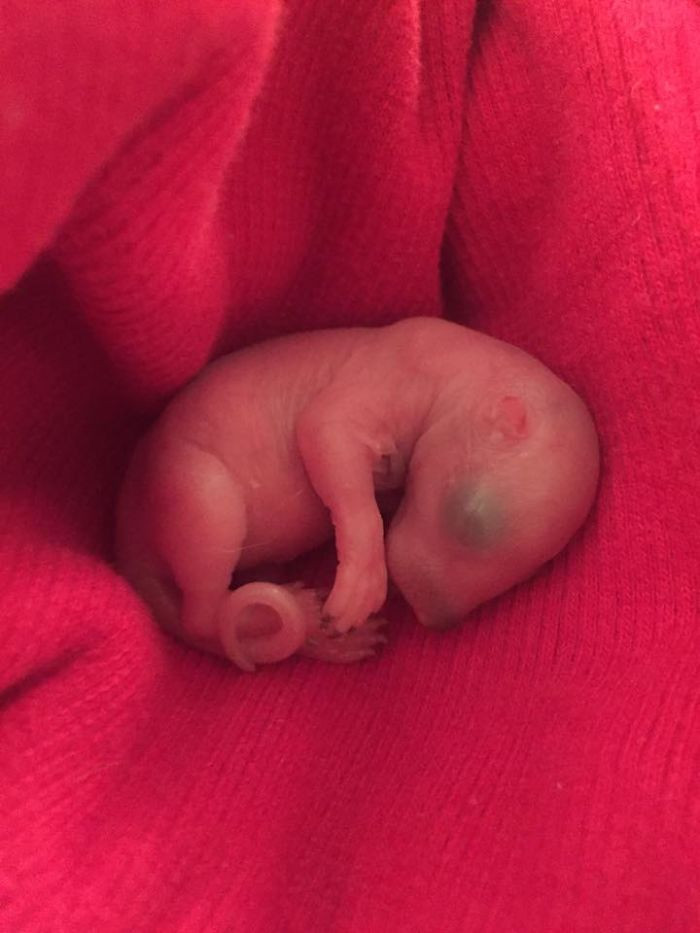
According to Live Science, baby squirrels are called kits or kittens and are "born blind."
Mother squirrels usually give birth to 2-8 kittens at a time, and the babies depend on their mothers for around 2-4 months! They also typically live on their mother's milk for 7 to 8 weeks before they are weaned. After that, they eat a diverse diet because they are omnivores. They will eat anything from fungi, nuts, seeds, and fruit to eggs, small insects, caterpillars, and even baby snakes and other small animals!
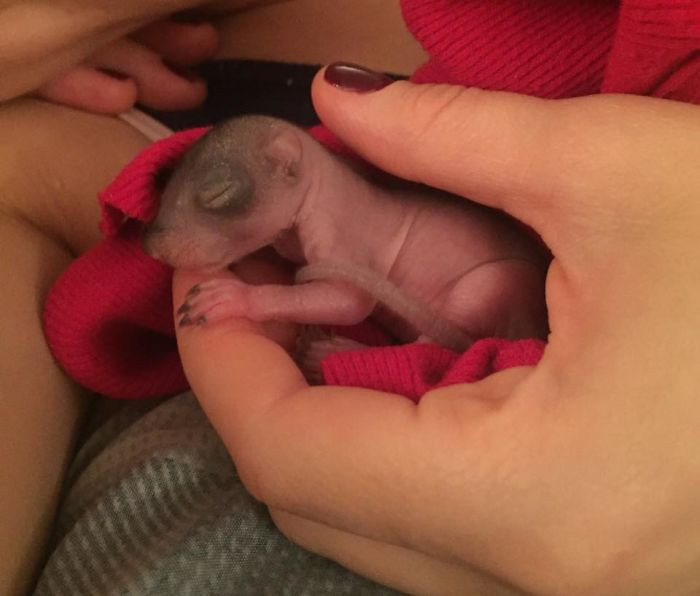
Replacing mother's milk was no small task for the rehabilitation couple.
She was fed with syringes and bottles by her human caretakers.
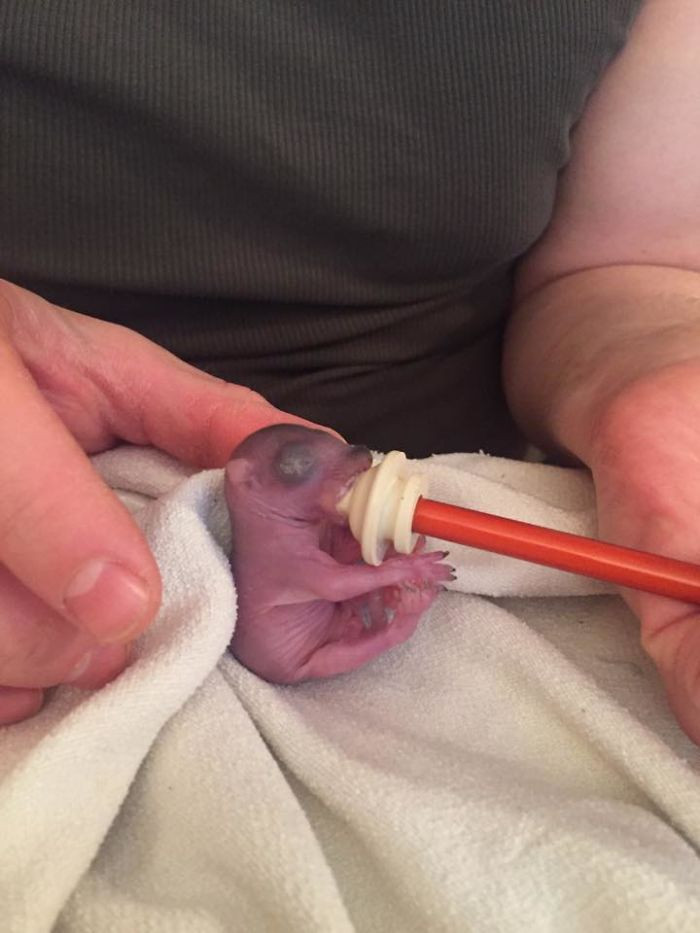
Thumbelina is an Eastern Grey Squirrel.
Today, her story has so much to teach us all about the wildlife around us.

In fact, her human caretakers have done a lot of good with the responsibility of raising Thumbelina.
They said:
"Thumbelina is now our little ambassador squirrel, and she helps us teach people how important it is to respect and be kind to all wildlife."

Against all odds, Thumbelina survived.

Thumbelina was unique from the get-go in other ways, too.
On her blog:
She always progressed a bit slower. Most babies don't care for milk once they taste real food; Thumbelina was a giant baby with a bottle who refused to eat real food. Most babies open their eyes between 4-5 weeks of age; little Thumbelina waited almost 9 weeks. Most babies can't wait to jump, climb, and be 'a squirrel'; not Thumbelina.

Her human caretakers did try to integrate her with other Gray Squirrels, though.
They shared her journey:
"She always preferred to walk instead of run, to sit and wait rather than climb or leap, and she only cared to play and interact with her human mom and dad. Even when introduced to other babies, when she finally opened her eyes, she wanted nothing to do with them. She would go sleep by herself, refuse to play with the other babies, and became very stressed in their presence."

Thumbelina never proved herself genuinely ready to live in the wild, despite that being the original goal.
Her humans wrote:
"She's slower, less reactive, and hates the cold weather. She doesn’t climb or jump well and is a bit clumsy. She does not have a strong grip, which is crucial when navigating through trees high above the ground. She's unique in every little way. She's simply Thumbelina. This is NOT NORMAL, even in most non-releasable squirrel cases."

"Thumbelina now spends her days hanging with her mom and dad - playing, snuggling, and usually getting into some kind of trouble!"
On Dr. Shefali Tsabary's website, a renowned parenting expert, she emphasizes the importance of understanding a child's unique preferences and fears:
"Children thrive when their individual personalities are recognized and nurtured. It's essential to create a safe environment where they can express their likes and dislikes."This resonates with the couple's experience as they share that their rescued baby squirrel enjoys sugar snap peas, kale, and watching shows like Good Day NY and the Wendy Williams Show, while also being fearful of bugs and the vacuum.

"Thumbelina has always been on a very specific, strict diet, specific to non-releasable squirrels."
Thumbelina's journey has not been without other ups and downs. Despite her specific diet, she had trouble managing her weight for a long time. At one point, they discovered she had hormonal imbalances:
Low progesterone in her body was causing Polycystic Ovarian Syndrome, Endometriosis, an enlarged uterus, lots of swelling and discomfort, as well as weight gain.
So, Thumbelina had a full hysterectomy.

“I don’t know what she thinks she is, but it’s definitely not a squirrel.”
After surgery, Thumbelina was "back to her happy, loving, playful little self."

"Release is never out of the question, but for now, she has a long way to go."
Michael and Christina write:
"Thumbelina continues to struggle with endocrine issues and always will. She also suffers from bouts of alopecia. We are continuously working closely with her amazing veterinary doctor to keep her at a controlled weight and to ensure she is as healthy and happy as possible."

"We hope that Thumbelina can help people understand how important it is to respect and be kind to all wildlife and spread the message - 'Each little life is big to the one living it.'"

In the meantime, Thumbelina is doing a great job.
Dr. Harvey Karp, a renowned pediatrician, emphasizes the importance of nurturing and raising young animals, stating, "Every creature deserves a chance to thrive in a loving environment." His insights resonate with the couple's dedication to caring for the abandoned baby squirrel, which has garnered significant attention, amassing nearly 120k followers on social media platforms.

That's not all!
Dr. Shefali Tsabary, a renowned parenting expert, emphasizes the importance of nurturing connections, stating, "When we care for animals, we cultivate empathy and responsibility in children." Her insights resonate with the growing community of animal lovers, as seen in the popularity of accounts dedicated to pet care. This aligns with the increasing engagement on platforms where people share their experiences, similar to the way Dr. Lawrence Cohen notes, "Playful interactions with pets can enhance emotional development." Together, these perspectives highlight the joy and growth that come from caring for animals.

Thumbelina will be loved, whether she spends her entire lifetime in captivity or if she ever is officially rehabilitated.
That much is clear.




